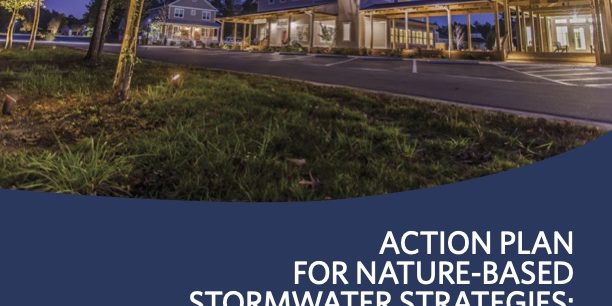The North Carolina Coastal Federation and The Pew Charitable Trusts are working to increase the use of Nature-based Stormwater Strategies statewide to reduce flooding and protect water quality.
The Action Plan for Nature-based Stormwater Strategies was developed by the North Carolina Coastal Federation with the support of The Pew Charitable Trusts, and input from four expert work groups focusing on opportunities for use of nature based stormwater strategies in new development, stormwater retrofits, roadways and working lands.
Nature-based strategies are effective stormwater management methods to reduce flooding and surface runoff while accommodating existing and future land uses, both urban and rural. The key principle of nature-based stormwater strategies is to maintain or mimic a site’s natural hydrology and capacity to collect, soak in and filter stormwater runoff. This can be achieved by implementing bioretention, disconnected impervious surfaces, permeable pavers and large-scale watershed restoration.
Strategic and innovation nature-based stormwater strategies are increasingly important as North Carolina faces the need to plan for climate adaption and resiliency. The Action Plan now positions North Carolina to better prepare for, and respond to, future stormwater flooding and water quality degradation.
“We have to rebuild stronger and smarter and ensure we can withstand the climate impacts of the future. What we know is that we have to act now. We cannot do the same old things and expect a different result. We have the opportunity to address flood risk and water quality and to make our communities safer.”
– Former DEQ Secretary, Michael Regan, Opening remarks on March 25, 2020
Nature-based Stormwater Strategies are:
Effective
Nature-based Stormwater Strategies reduce flooding, improve water quality, recharge groundwater and helps balance economic development with natural resource management.
Economical
Using low impact development (LID) methods in place of conventional methods can result in capital cost savings up to 80%, according to a 2007 EPA report.
Advantageous
According to a 2018 U.S. Army Corps of Engineers report, LID practices capitalize on the existing landscape to manage stormwater at its source, while providing social, economic and environmental benefits.
Adaptable
Nature-based Stormwater Strategies can be incorporated on all types of land uses including development and retrofit projects, transportation systems and working lands.
Sensible
Nature-based Stormwater Strategies have been applied to projects across North Carolina—like the Market at Colonnade Center in Raleigh—and are used across the country.
New Development
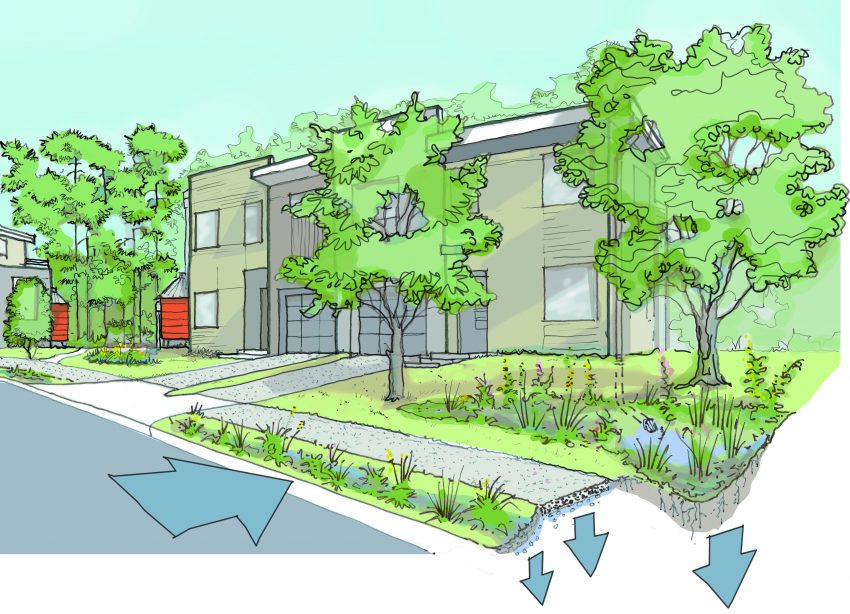
Nature-based Stormwater Strategies are most effective when implemented early on in the design phase of new development projects.
Nature-based Stormwater Strategies such as permeable pavement, cisterns and rain gardens promote infiltration and rainwater reuse. These techniques reduce stormwater runoff even on high density development sites.
Stormwater Retrofits
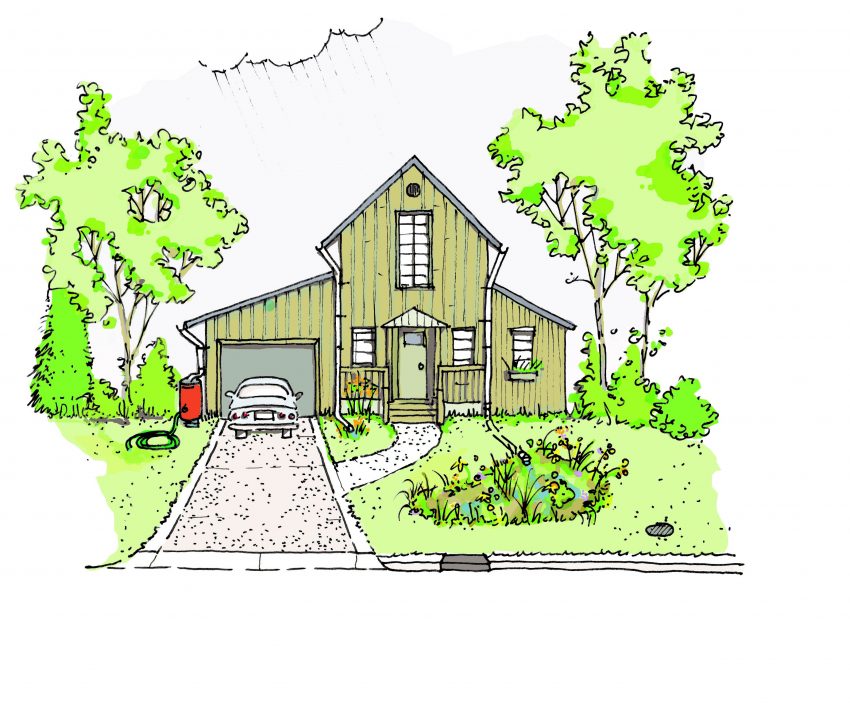
Nature-based Stormwater Strategies are effective and economical methods to improve water quality by disconnecting impervious surfaces.
On conventional lots, rainwater hits impervious surfaces and collects pollutants as it runs to storm drains. Stormwater runoff is reduced by installing retrofits to disconnect impervious surfaces.
Roadways
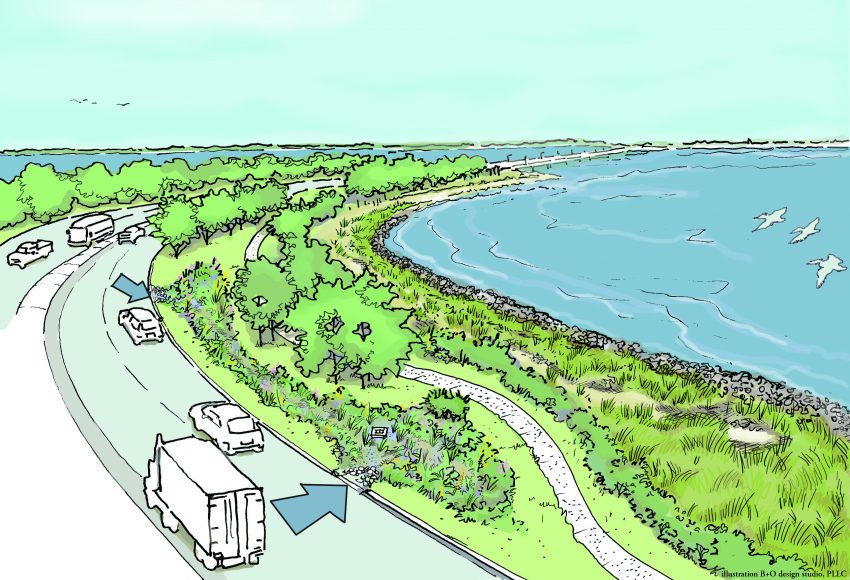
Nature-based Stormwater Strategies can be implemented along inland and coastal roadways to reduce runoff and reduce maintenance costs.
An inland highway uses grassed swales to collect and infiltrate runoff, which reduces flooding and discharge to surface waters.
Working Lands
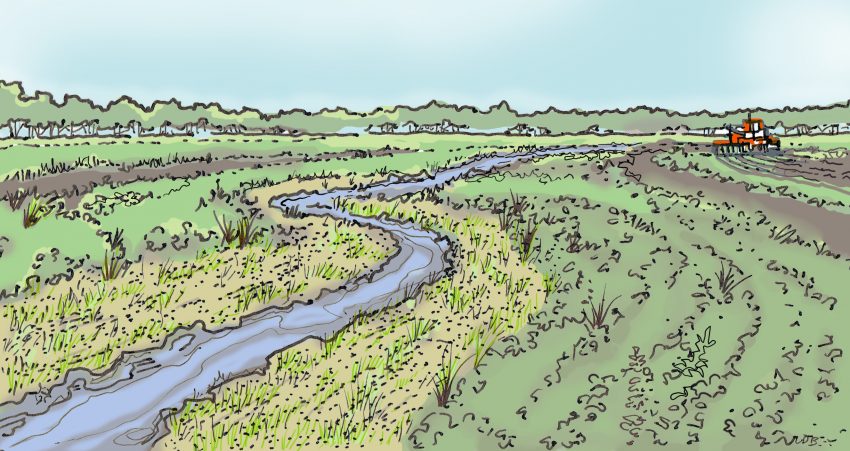
Nature-based Stormwater Strategies help restore natural hydrology on farm and forest land.
This converted wetland was restored to its natural stream bed hydrology to collect runoff from adjacent working lands.
Stay Informed
Subscribe for Nature-based Stormwater Strategy Updates
Development
Over the course of 2020, the Action Plan was developed with input from over 60 work group members, representing North Carolina state and local government agencies, businesses, universities, non-profits and other sectors. They dove into stormwater management approaches and opportunities related to New Development, Stormwater Retrofits, Roadways and Working Lands. The work groups identified barriers to, and opportunities for, using nature-based stormwater strategies for these land uses.
Due to the COVID-19 pandemic, the work groups met for many hours virtually and provided written input and feedback over the course of 2020 to develop a strategic set of findings and recommendations for advancing nature-based stormwater strategies.
Cross-Cutting Recommendations
As the four work groups considered how to address these impediments at the state, local and project-specific level, four recommendations were identified and encouraged across those discussions.
- State and local governments need to lead by example by promoting the use of nature-based stormwater strategies and implementing them widely where practicable.
- Increase education, outreach and professional training for nature-based stormwater and watershed management strategies.
- Create a Nature-Based Stormwater Steering Committee to ensure continued stakeholder engagement and leadership in support of long-term, meaningful progress.
- Establish effective watershed management that focuses on protecting, restoring or mimicking natural water systems to reduce flooding and improve water quality.
Milestones
Stakeholder Session
The Federation worked with the Pew Charitable Trusts, the N.C. Office of Recovery and Resiliency, N.C. Department of Administration, and Governor Roy Cooper’s office to organize a stakeholder session on the application of nature-based solutions under Executive Order 266. The event was held on May 10, 2023. Over 50 participants joined Gov. Cooper’s Policy Advisor and representatives of the N.C. Office of Recovery and Resiliency and N.C. Department of Administration in Raleigh for the stakeholder session on incorporating nature-based solutions in the State’s Uniform Floodplain Management Policy update. The event was a kickoff session to gain input and ideas for the policy update that is called for in Gov. Cooper’s Executive Order 266.
Advancing Nature-Based Strategies
Leaders in the N.C. General Assembly, Governor’s Office, and across state agencies, have taken big steps and made great progress in ramping up statewide momentum to utilize nature and nature-based strategies to address flooding and water quality concerns and increase resiliency.
Gov. Roy Cooper Issues Executive Order 266
As a Key recommendation of the Action Plan for Nature-based Stormwater Strategies, in July 2022, Gov. Roy Cooper issued Executive Order 266 to ensure all state construction projects are flood-resilient. This action aims to limit new construction in areas that are prone to flooding, and use innovative designs and materials to help buildings withstand floodwaters. The executive order also emphasizes using effective and efficient nature-based infrastructure to reduce flood damages to state property and the costs that taxpayers shoulder after a disaster. Read More >
Blueprint Under Development
In 2021, the North Carolina General Assembly appropriated $20 million dollars to develop a Statewide Flood Resiliency Blueprint (Blueprint). The Blueprint is intended to be a decision-making tool, foundational to the state flood planning process to determine how and where resources should be allocated and to determine flood resiliency projects that should be implemented to increase community resiliency to flooding. The Blueprint will be applied within river basins affected by past and future flood-related losses. The Blueprint is a key recommendation in the Action Plan for Nature-based Stormwater Strategies Action Plan.
Funding Appropriated
Recognizing the value of nature-based strategies, the North Carolina Land and Water Fund appropriated $15 million in the FY 2021-22 State budget to establish a flood risk reduction grant program to prioritize the design, implementation, and preservation of nature-based infrastructure. Read More >
The N.C. Division of Water Infrastructure is currently awarding approximately $82 million American Rescue Plan Act (ARPA) stormwater project funding through the N.C. Local Assistance for Stormwater Infrastructure Investments (LASII) program. The fund gives higher priority to nature-based strategies. Read More >
N.C. Division of Coastal Management Adopts Guidelines & Principles
Following adoption of the Action Plan for Nature-based Stormwater Strategies, the N.C. Division of Coastal Management developed a set of Principles and Guidelines for Financial Support of Coastal Resiliency Projects (make a link see below) to guide the agency’s coastal resiliency funding program. This type of nature-based strategy prioritization is consistent with Governor Cooper’s North Carolina’s Natural and Working Lands Action Plan and Climate Risk Assessment and Resilience Plan (2020).
N.C. Department of Transportation
DOT includes a Hydraulics Unit that’s part of its Highway Stormwater Program (HSP) that works diligently to protect and improve water quality. Over the past several years they have embraced nature-based stormwater strategies in their planning, design and construction. In 2015, they installed an innovative stormwater retrofit project near the Lockwood Folly River in Brunswick County, providing new technology to reduce bacteria, nitrogen, phosphorous, and suspended solids from reaching the river. The team has also installed multiple stormwater retrofits across the state including a current retrofit project on Cedar Street in Beaufort, N.C. and the construction of a living shoreline project in Cedar Point.
In 2020 the DOT Hydraulics Unit and additional DOT staff served a critical role in developing the Nature-based Stormwater Strategies Action Plan released by the Federation and The Pew Charitable Trusts in 2021. DOT is currently updating their stormwater design manual to include more nature-based stormwater policies and design standards for transportation projects. The Unit is on the cutting edge of research and advancement of effective stormwater management.
Example Projects
Mountains
Resources
Fact Sheets
- What are Nature-based Stormwater Strategies?
- Nature-based Stormater Strategies for New Development
- Nature-based Stormwater Strategies for Retrofits
- Nature-based Stormwater Strategies for Roadways
- Nature-based Stormwater Strategies for Working Lands
Related News
- Nature-based solution gets support from White House
- Stakeholders Meet to Advance Nature-based Stormwater Management in North Carolina – Pew Charitable Trusts
- State Now Has Plan for Climate Resilience – Coastal Review Online
- Our Coast – The Stormwater Solution: An Action Plan for Nature-based Stormwater Strategies
- Advancing Use of Green Stormwater Infrastructure
- Flood-Resiliency Study Reveals Solutions, Big Challenges
- State DOT Stormwater Design Manual Set for Major Update
Meeting Resources
- Project Background
- Press Packet: NBSS Press Conference | March 3rd, 2021
- Full Working Group Meeting Opening Session | Aug. 23rd, 2021
- Full Working Group Meeting Resources | Aug. 23rd, 2021
Learn more:
Contact: Lauren Kolodij, Deputy Director – laurenk@nccoast.org 252-393-8185

